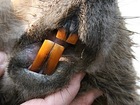Negotiators will look at ways to keep alive global efforts to fight climate change as they meet in Panama, with barely a year to go before commitments run out under the Kyoto Protocol.
In what has been described as a dress rehearsal for the closely watched U.N. conference in Durban, South Africa starting November 28, climate envoys from around the world are holding a week of talks starting Saturday in Panama City.
 Full Story
Full Story
A decommissioned NASA satellite, the biggest piece of U.S. space junk to fall in 30 years, has crash-landed, but the precise location is not yet known, the U.S. space agency said early Saturday.
The Upper Atmosphere Research Satellite (UARS) fell back to Earth between 11:23 pm Friday and 1:09 am Saturday (0323-0509 GMT Saturday), but the precise re-entry time and location "are not yet known with certainty," NASA said.
 Full Story
Full Story
Physicists reported Thursday that sub-atomic particles called neutrinos can travel faster than light, a finding that -- if verified -- would blast a hole in Einstein's theory of relativity.
In experiments conducted between the European Center for Nuclear Research (CERN) in Switzerland and a laboratory in Italy, the tiny particles were clocked at 300,006 kilometers per second, about six km/sec faster that the speed of light, the researchers said.
 Full Story
Full Story
A U.S. biotech company said Thursday it will soon begin the first-ever European trials using human embryonic stem cells in an experimental treatment for people with a form of juvenile blindness.
The Massachusetts-based Advanced Cell Technology said the trials will involve 12 patients with Stargardt's disease and will be based at Moorfields Eye Hospital in London, with more European sites planned for the future.
 Full Story
Full Story
A mix of sprinkling system water and melted aluminum from aircraft hulls likely triggered the explosions that felled New York's Twin Towers on September 11, 2001, a materials expert told a technology conference Wednesday.
"If my theory is correct, tons of aluminum ran down through the towers, where the smelt came into contact with a few hundred liters of water," explained Christian Simensen, a scientist at SINTEF, an independent technology research institute based in Norway.
 Full Story
Full Story
Sharks are primitive creatures but their bodies produce a sophisticated substance that shows promise in fighting a range of human viruses from hepatitis to yellow fever, researchers said Monday.
The compound, called squalamine, was discovered in 1993 but the study in the Proceedings of the National Academies of Sciences is the first to explore its potential use against human viruses.
 Full Story
Full Story
China said Tuesday it will launch its Tiangong-1 space module later this month, marking its first step towards building a Chinese space station.
The Asian giant sees its space program as a symbol of its global stature, growing technical expertise, and the Communist Party's success in turning around the fortunes of the formerly poverty-stricken nation.
 Full Story
Full Story
Drugs fed to animals to promote growth and prevent diseases may play a key role in the emergence of antibiotic resistant bacteria, microbiologists said.
The practice of administering large quantities of antimicrobial drugs "favors the emergence of drug resistant bacteria that can spread to humans through the consumption of contaminated food, from direct contact with animals or by environmental spread," said Awa Aidara-Kane of the World Health Organization.
 Full Story
Full Story
The Bureau of Land Management says a fossil found by employees on federal land represents the earliest record of living beavers in North America.
The pair of teeth was found on BLM land in northeast Oregon.
 Full Story
Full Story
The United States issued a ruling on Friday saying that five world populations of loggerhead sea turtles are endangered species but four are only "threatened."
The decision to split up loggerhead turtles into nine separate populations for conservation efforts was detailed in a 331-page document by the U.S. Fish and Wildlife Service and the National Oceanic and Atmospheric Administration.
 Full Story
Full Story



